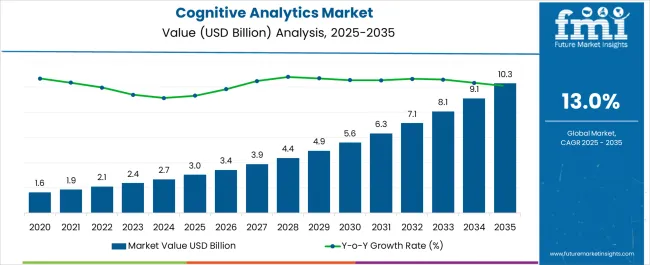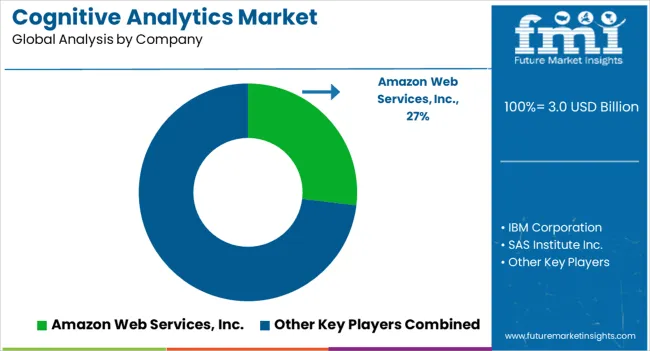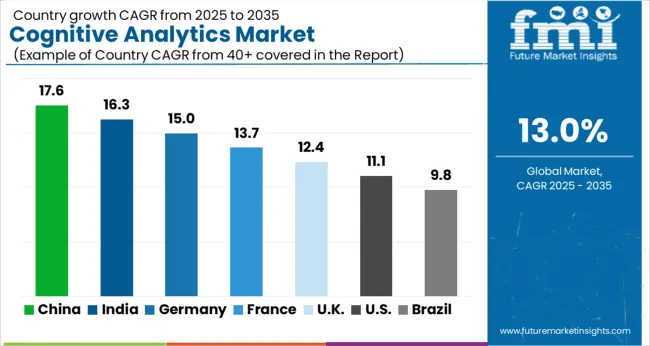The Cognitive Analytics Market is estimated to be valued at USD 3.0 billion in 2025 and is projected to reach USD 10.3 billion by 2035, registering a compound annual growth rate (CAGR) of 13.0% over the forecast period.

| Metric | Value |
|---|---|
| Cognitive Analytics Market Estimated Value in (2025 E) | USD 3.0 billion |
| Cognitive Analytics Market Forecast Value in (2035 F) | USD 10.3 billion |
| Forecast CAGR (2025 to 2035) | 13.0% |
The cognitive analytics market is witnessing strong momentum fueled by the growing integration of artificial intelligence into decision making processes and the increasing reliance on advanced data insights across industries. Organizations are leveraging cognitive technologies to enhance predictive accuracy, automate complex workflows, and improve customer engagement.
The adoption of cloud computing and big data platforms has further accelerated market expansion by enabling scalable analytics solutions. Regulatory focus on data governance and risk management is also contributing to the widespread deployment of cognitive tools.
The market outlook remains highly positive as enterprises across healthcare, finance, and retail continue to prioritize innovation, accuracy, and efficiency in data driven strategies. Continuous investment in AI research and the development of domain specific models are expected to strengthen future adoption trends.
The machine learning segment is projected to account for 54.60% of total revenue by 2025 within the technology category, making it the dominant segment. Its leadership is attributed to its ability to process large volumes of structured and unstructured data, identify hidden patterns, and enable predictive decision making.
The growing integration of machine learning algorithms into business intelligence platforms has supported faster and more accurate insights. Continuous innovation in natural language processing and deep learning models has reinforced its applications in real time analytics, further expanding its adoption.
Enterprises value the adaptability and scalability of machine learning, which continue to position it as the cornerstone technology in the cognitive analytics landscape..
The fraud and risk management segment is expected to represent 47.80% of market revenue by 2025 within the application category, emerging as the most significant application area. This prominence is being driven by rising instances of cybercrime, financial fraud, and compliance breaches, which require advanced detection and prevention mechanisms.
Cognitive analytics enables organizations to monitor anomalies, assess behavioral patterns, and implement proactive safeguards against risks. The ability to deliver real time alerts and predictive risk assessments has positioned it as a crucial tool across banking, insurance, and regulatory industries.
As businesses prioritize data integrity and operational resilience, fraud and risk management remains the leading application of cognitive analytics.
The healthcare industry segment is set to contribute 41.30% of overall revenue by 2025, establishing it as the leading industry vertical for cognitive analytics adoption. This growth is being supported by the increasing use of AI driven analytics for diagnostics, personalized treatment, and patient monitoring.
Healthcare providers are leveraging cognitive tools to process large volumes of clinical data, accelerate disease detection, and improve treatment accuracy. The demand for predictive analytics in hospital resource allocation and drug discovery has further strengthened adoption.
With rising emphasis on patient outcomes, cost efficiency, and regulatory compliance, healthcare has become the most prominent industry segment, shaping the future trajectory of cognitive analytics.
Cognitive analytics simulate the human thought process to learn from the data such as speech-to-text and text-to-speech recognition. Cognitive analytics brings together several intelligent technologies such as deep learning, image recognition, machine learning, semantic computing, artificial intelligence, and among others. Cognitive analytics solutions are increasing in adoption for human cognition and self-correcting for continuous learning.
Cognitive analytics solutions allow enterprises to identify critical patterns, enhance business performance, and develop high-quality business predictions. Cognitive analytics is used to advise and execute trading, as well as for advanced risk underwriting and fraud detection.
Several enterprises are offering cognitive analytics solutions for applications such as data warehousing, information management, and big data analytics services to develop data management from unstructured and structured data. These factors are increasing the demand for cognitive analytics solutions.
Cognitive computing has become the foremost important enabler of business transformation in a growing number of industries. Cognitive computing technology is a department of applied science that automates tasks that traditionally require perceptual and cognitive abilities from humans.
In the Automotive & Transportation industry, in the era of an increasing craze for autonomous vehicles, cognitive computing could make its way deeper into the transportation industry. Cognitive computing can take supervision of traveling requirements direct from booking tickets for flights and hotels to providing personalized recommendations during travel.
Cognitive computing technology can help with airport navigation and also provide translation assistance at foreign destinations. These factors are increasing the demand for cognitive computing, which increases market growth.
Technological advancements in the healthcare and medical industry have allowed physicians and other healthcare providers to treat their patients and diagnose them efficiently. Cognitive analytics in healthcare combines the functioning of humans and machines where machines and the human brain actually overlap to enhance human decision-making for diagnosis and treatments.
The healthcare and medical industry is starting to use cognitive analysis to cater to its patients with the best possible treatments. Cognitive analytics is mainly used for the treatment and detection of critical diseases. Patients and their families will be able to use the system via a cognitive hospital app on virtual home computers or any smartphone.
The advents of cognitive analytics systems are on the rise in the healthcare and wellness industry which is increasing market growth.

Some of the prominent players in the cognitive analytics market are

Based on the region, the cognitive analytics market has been segmented into North America, Latin America, East Asia, Europe, South Asia & Pacific, and Middle East & Africa. North America is holding the largest market share due to the high presence of cognitive computing analytics solution providers in this region.
In Europe and South Asia & Pacific regions, organizations are adopting cognitive analytics for the digital transformation of business functions, which is expected to grow at the highest growth rate during the forecast period.
The cognitive analytics market report is a compilation of first-hand information, qualitative and quantitative assessments by industry analysts, and inputs from industry experts and industry participants across the value chain. The report provides an in-depth analysis of parent market trends, macroeconomic indicators, and governing factors, along with cognitive analytics market attractiveness as per segment.
The cognitive analytics market report also maps the qualitative impact of various market factors on cognitive analytics market segments and geographies.
The global cognitive analytics market is estimated to be valued at USD 3.0 billion in 2025.
The market size for the cognitive analytics market is projected to reach USD 10.3 billion by 2035.
The cognitive analytics market is expected to grow at a 13.0% CAGR between 2025 and 2035.
The key product types in cognitive analytics market are machine learning, natural language processing and others.
In terms of application, fraud and risk management segment to command 47.8% share in the cognitive analytics market in 2025.






Our Research Products

The "Full Research Suite" delivers actionable market intel, deep dives on markets or technologies, so clients act faster, cut risk, and unlock growth.

The Leaderboard benchmarks and ranks top vendors, classifying them as Established Leaders, Leading Challengers, or Disruptors & Challengers.

Locates where complements amplify value and substitutes erode it, forecasting net impact by horizon

We deliver granular, decision-grade intel: market sizing, 5-year forecasts, pricing, adoption, usage, revenue, and operational KPIs—plus competitor tracking, regulation, and value chains—across 60 countries broadly.

Spot the shifts before they hit your P&L. We track inflection points, adoption curves, pricing moves, and ecosystem plays to show where demand is heading, why it is changing, and what to do next across high-growth markets and disruptive tech

Real-time reads of user behavior. We track shifting priorities, perceptions of today’s and next-gen services, and provider experience, then pace how fast tech moves from trial to adoption, blending buyer, consumer, and channel inputs with social signals (#WhySwitch, #UX).

Partner with our analyst team to build a custom report designed around your business priorities. From analysing market trends to assessing competitors or crafting bespoke datasets, we tailor insights to your needs.
Supplier Intelligence
Discovery & Profiling
Capacity & Footprint
Performance & Risk
Compliance & Governance
Commercial Readiness
Who Supplies Whom
Scorecards & Shortlists
Playbooks & Docs
Category Intelligence
Definition & Scope
Demand & Use Cases
Cost Drivers
Market Structure
Supply Chain Map
Trade & Policy
Operating Norms
Deliverables
Buyer Intelligence
Account Basics
Spend & Scope
Procurement Model
Vendor Requirements
Terms & Policies
Entry Strategy
Pain Points & Triggers
Outputs
Pricing Analysis
Benchmarks
Trends
Should-Cost
Indexation
Landed Cost
Commercial Terms
Deliverables
Brand Analysis
Positioning & Value Prop
Share & Presence
Customer Evidence
Go-to-Market
Digital & Reputation
Compliance & Trust
KPIs & Gaps
Outputs
Full Research Suite comprises of:
Market outlook & trends analysis
Interviews & case studies
Strategic recommendations
Vendor profiles & capabilities analysis
5-year forecasts
8 regions and 60+ country-level data splits
Market segment data splits
12 months of continuous data updates
DELIVERED AS:
PDF EXCEL ONLINE
Content Analytics Discovery And Cognitive Systems Market Size and Share Forecast Outlook 2025 to 2035
Content Analytics, Discovery, and Cognitive Software Market Analysis by Product Type, End User, and Region through 2035
Cognitive Supply Chain Market Forecast Outlook 2025 to 2035
Analytics Of Things Market Size and Share Forecast Outlook 2025 to 2035
Cognitive Computing Market Size and Share Forecast Outlook 2025 to 2035
Cognitive Impairment Biomarkers Market Size and Share Forecast Outlook 2025 to 2035
Cognitive Electronic Warfare Market Size and Share Forecast Outlook 2025 to 2035
Cognitive Agents Market Size and Share Forecast Outlook 2025 to 2035
Cognitive Network Market Size and Share Forecast Outlook 2025 to 2035
Cognitive Diagnostics Market Analysis & Forecast by Diagnosis, Indication, End User and Region through 2035
Cognitive health supplements market analysis by product type, form, sales channel, functionality, and by region – Growth, trends, and Forecast from 2025 to 2035
Analytics as a Service (AaaS) Market - Growth & Forecast 2025 to 2035
Cognitive Neuroscience Market Overview – Trends & Research Insights 2024-2034
Cognitive Assessment and Training Market Report – Trends & Growth Forecast 2024-2034
Analytics Sandbox Market
Cognitive Data Management Market
Cognitive Security Market
Cognitive Systems Spending Market Report – Growth & Forecast 2016-2026
Ad Analytics Market Growth - Trends & Forecast 2025 to 2035
HR Analytics Market

Thank you!
You will receive an email from our Business Development Manager. Please be sure to check your SPAM/JUNK folder too.
Chat With
MaRIA